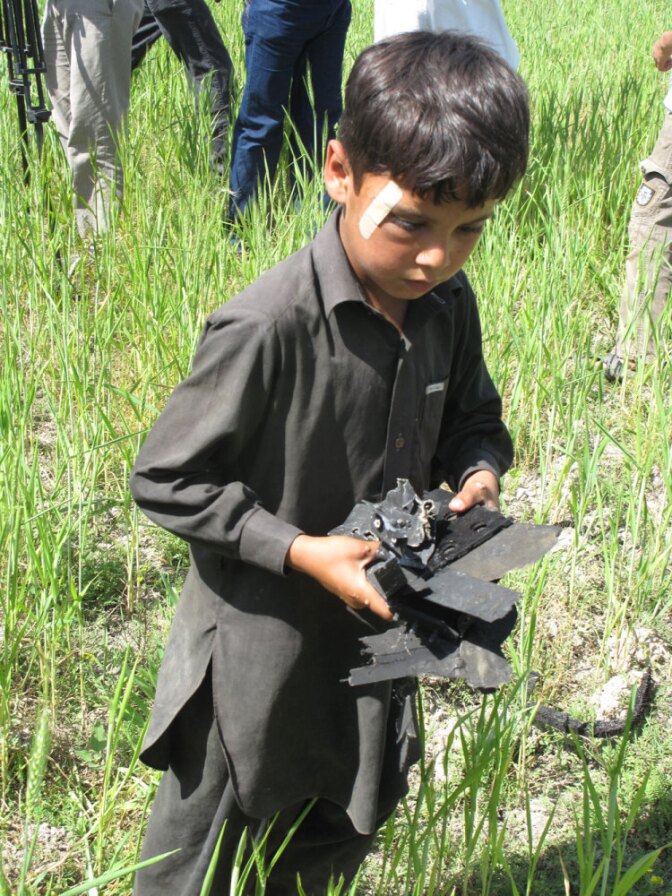This story is free to read because readers choose to support LAist. If you find value in independent local reporting, make a donation to power our newsroom today.
Neighbors Saw Little At Bin Laden Compound

Pakistan is under intense scrutiny over how Osama bin Laden was able to hole up in a million-dollar compound in the Pakistani garrison town of Abbottabad.
President Asif Ali Zardari on Tuesday denied the suggestion that the government sheltered bin Laden before he was killed in a U.S. operation. In an opinion piece published in The Washington Post, he wrote, "Some in the U.S. press have suggested that Pakistan lacked vitality in its pursuit of terrorism, or worse yet that we were disingenuous and actually protected the terrorists we claimed to be pursuing. Such baseless speculation ... doesn't reflect fact."

The tight security cordon that had been thrown up around the heavily fortified, three-story mansion where bin Laden apparently evaded detection for years melted away Tuesday. The media that have descended on this town nestled in the green-carpeted hills of northwest Pakistan were finally given a close-up view of the bin Laden compound from the outside.
Surrounding the compound is a wall approximately 20 feet tall topped with a razor-wire fence. With walls so high, only the third floor of the house inside the property is entirely visible. The whole compound runs the length of nearly two football fields.
Neighbors say it's the biggest house in the area, and that the people inside were extremely discreet and did not engage with other residents. With so little contact, neighbors could only speculate on what went on here.
Some believed that a rich man lived here — a rich man who perhaps had tribal enmities that warranted such elaborate security and secrecy.
Nasim Bibi lives with 12 members of her family in a humble house no more than 15 feet in front of bin Laden's concrete compound. A mother of seven, Bibi says the only activity she saw in the house was two men who would occasionally come and go — presumably the close confidants of bin Laden, who acted as his couriers and who were killed in this week's raid.
Speaking in Urdu, Nasim Bibi says the men looked as though they were Pashtuns — they would wear shalwar kameez, the long tunic and trousers — and that they looked Pakistani.
But the dramatic end to the long-running manhunt that had finally caught the man who came to embody global terrorism opened up a new set of chilling uncertainties.
Shortly after the Navy SEALs lifted off with bin Laden's body, headed for a burial at sea, Bibi says, Pakistani security forces came knocking on her door in the middle of the night.
She says her husband, who was inside the house the night of the operation, was called outside by the military and taken away — she doesn't know where. Nor does she know where her two young sons are. They left for school Monday and never returned.
Locals report that other residents living near the bin Laden compound have also been taken away.
A spokesman for the army denied that military personnel could have been involved in the disappearances.
Revelations that bin Laden had been hiding in a compound in a tranquil military hill town, possibly for years, have caused huge embarrassment for Pakistan's military and intelligence establishment.

The government Tuesday issued a stern rebuke to critics who suggest either incompetence or collusion on the part of Pakistan's security apparatus. The Foreign Office statement said the country's intelligence agency "had been sharing information with CIA and other friendly intelligence agencies since 2009" regarding the targeted compound.
Iqbal Shah, who lives near the bin Laden spread, offered this explanation: "Maybe they don't know what is happening around. That's why."
He admits that would be troubling.
And what Islamabad knew about bin Laden residing for years in a town that is home to the country's top military academy two hours from the capital is a question that deeply troubles Washington. U.S. lawmakers are threatening a review of billions of dollars in U.S. aid that flows to Pakistan.
Bin Laden's demise is the end of a chapter. But it is the beginning of new round of deepening tension between the Unites States and nuclear-armed ally Pakistan.
Copyright 2022 NPR. To see more, visit https://www.npr.org. 9(MDA1OTI3MjQ5MDEyODUwMTE2MzM1YzNmZA004))








